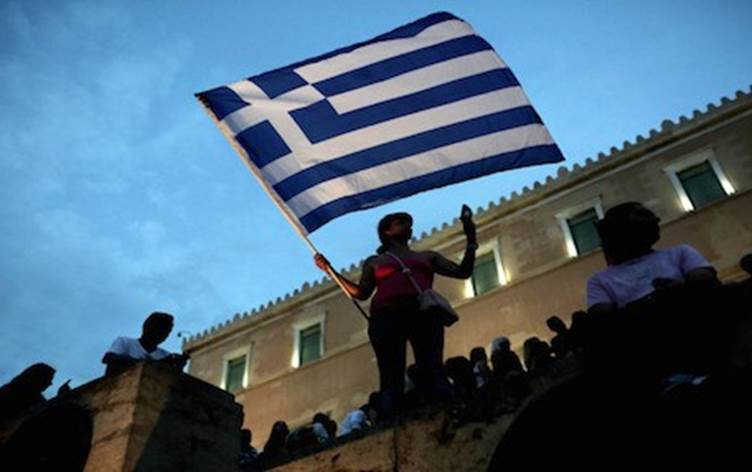Europe’s “Arab Spring” is dead. It died when Athens buckled under the pressure of its German-led European creditors, who have acted no better than a cabal of thugs.
Once again, the people lost – this time in the cradle of Western democracy.
Dictators do not always appear in the guise of individuals. In the case of Greece, they came as a group of countries lording over an elected government.
Powers greater than the people’s will are winning.
Their victory is a warning to the less-wealthy nations of southern Europe, a threat that they too will follow the fate of Athens if they try to sabotage a European project in which Germany decides and others follow.
The real Arab Spring was ignited when Tunisian vegetable vendor Mohammed Bouazizi set himself alight in December 2010. The hope that swept across the Arab world with his act was extinguished by internal violence, the suppression of political movements and the usurpation of power.
Tunisia is now the only Arab Spring experiment that is still functioning.
Our timid European Spring was ignited when the defiant Greek Prime Minister Alexis Tsipras won last January’s elections, promising to finish with the austerity measures imposed by other European Union finance ministers and institutions, such the European Central Bank (ECB) and the International Monetary Fund (IMF).
The measures had created a humanitarian crisis in Greece and Tsipras thought he would emulate the Biblical story of David and Goliath, not remembering that the challenge posed by Europe’s economic powers is bigger than the largest of giants.
“We took on powerful opponents, we clashed with the international financial system,” Tsipras had declared after the defeat, signaling he had agreed to a pact he did not believe in. But he had to swallow it to avoid bankruptcy or being kicked out of the Eurozone.
On Thursday, the Greek Parliament approved a packet of more austerity measures, amid what some MPs had called blackmail, humiliation and a coup d’etat.
That act said goodbye to democracy!
On the 5th of this month Greeks had voted in a referendum against the new bailout. That is why last Wednesday night thousands of Greeks poured into the streets, this time shouting and throwing Molotov cocktails, to see if the explosion from their crude petrol bombs could reach the ears of those who had not heard their ballots.
Also on Thursday, European leaders agreed to unlock an emergency lifeline of billions of euros for Greece. But most of that money will go to make a debt payment on Monday, not to help impoverished Greeks.
Only a small light still shines for Greece: the IMF has signalled that it may not back the new bailout if there is not an important reduction of Greek debt, or a 30-year moratorium on repayments, to make its economic growth sustainable. That is the same realistic line that Tsipras supports.
Usually, when indecent creditors meet decent people, brass knuckles and a dark alley may be involved. When the creditors came to collect from Greece, the scenario was no different.
“Nothing shocks me these days – our Eurozone is a very inhospitable place for decent people,” said former Greek Finance Minister Yanis Varoufakis in a recent interview with Britain’s New Statesman.
He led the first negotiations of the Tsipras government with European lenders, then forced to quit after the referendum, under pressure by his European Union counterparts.
In the same interview, Varoufakis said that there is a “complete lack of any democratic scruples, on behalf of the supposed defenders of Europe’s democracy.”
German Finance Minister Wolfgang Schauble has been the harsher critic of Greece, fully controlling the negotiations and signalling his support to a temporary exit of Greece from the euro.
As Varoufakis put it in the interview, “there will be times when the orchestra is out of tune, but he convenes and puts it back in line.”
Athens was forced to succumb to the tyranny of the most tyrant dictator: the European Union’s richest.
Should we, the less-rich nations of the Mediterranean, such as Spain, Portugal or Italy be afraid of what can happen to us next?
I think the answer is “Yes.”
The views expressed in this article are those of the author and do not necessarily reflect the position of Rudaw.




Comments
Rudaw moderates all comments submitted on our website. We welcome comments which are relevant to the article and encourage further discussion about the issues that matter to you. We also welcome constructive criticism about Rudaw.
To be approved for publication, however, your comments must meet our community guidelines.
We will not tolerate the following: profanity, threats, personal attacks, vulgarity, abuse (such as sexism, racism, homophobia or xenophobia), or commercial or personal promotion.
Comments that do not meet our guidelines will be rejected. Comments are not edited – they are either approved or rejected.
Post a comment